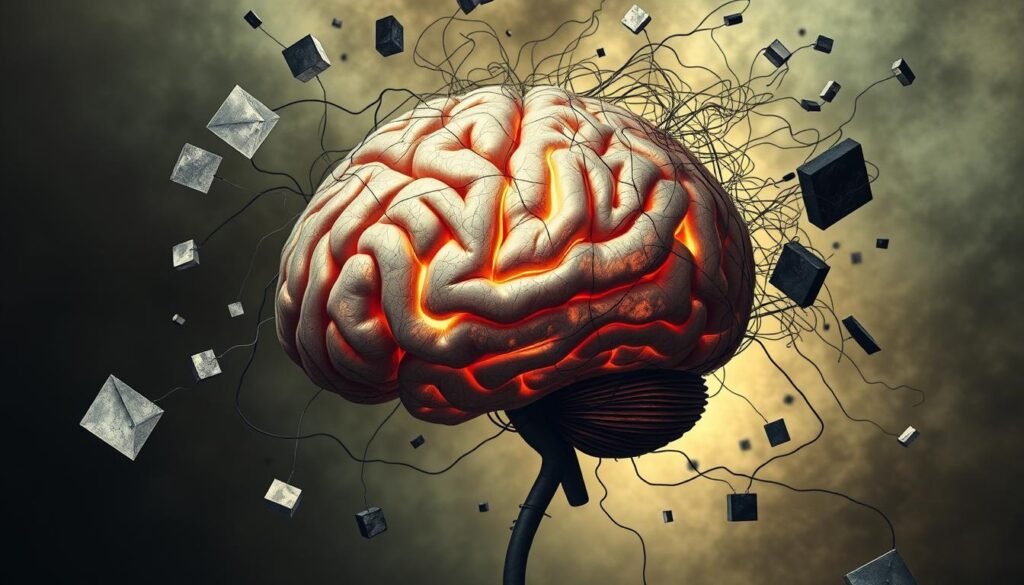Have you thought about how the fight against lupus is more than just physical? Lupus and mental health have a deep connection that begs a closer look. The disease doesn’t just attack the body but often the mind too. This can trigger a range of emotional struggles. It’s key to figure out if lupus causes depression or just adds to it. Understanding how autoimmune diseases affect mental health is vital for anyone facing these challenges.
Statistics show a worrying trend. People with lupus are more likely to have depression and anxiety. About 22.1% of those with lupus feel depressed, and 40% experience anxiety. Support is out there. We’ll look into how lupus impacts mental health and offer tips for coping with these issues. The goal is to help folks find their way to better emotional health.
Key Takeaways
- Lupus affects not only physical health but also significantly impacts mental well-being.
- Rates of depression and anxiety are significantly higher in individuals with lupus.
- The link between autoimmune disorders and mental health requires further exploration.
- Recognizing the signs of mental health challenges is critical for individuals with lupus.
- Professional help and support networks play a crucial role in managing lupus-related depression.
- Understanding emotional burdens related to chronic illnesses can lead to better management strategies.
Understanding Lupus and Its Impact on Health
Lupus, particularly Systemic Lupus Erythematosus (SLE), is a chronic illness that affects many parts of the body. It leads to significant health problems, varying from mild to severe. Those with lupus often deal with fatigue, joint pain, and various lupus symptoms, reducing their quality of life.
The disease also brings emotional and psychological challenges. Studies show a strong connection between lupus and mental health problems like depression and anxiety. It’s found that people with lupus may be more likely to experience clinical depression, with rates ranging from 15 to 60 percent.
Several factors worsen these emotional struggles. The physical symptoms of lupus can cause ongoing emotional stress. This may lead to feeling hopeless or helpless. Lupus treatments, such as corticosteroids like prednisone, can also affect one’s mood and anxiety levels.
Additionally, lupus can come with neurological symptoms, which include problems with thinking and mood changes. This highlights the link between chronic illness and mental health. Understanding and managing lupus means addressing both physical and emotional aspects. This requires support systems and coping strategies that meet the unique needs of those with lupus.
The Connection Between Autoimmunity and Mental Health
Autoimmune diseases like lupus deeply affect mental health. They can change how we feel emotionally and mentally. People with these conditions deal with ongoing pain, tiredness, and the stress of handling their illness. These issues can lay the groundwork for mental health challenges, especially depression and anxiety.
Here’s a stark fact: people with lupus are much more likely to be depressed than those without it. In fact, the chance is six times higher. About 37% of those with lupus also face serious anxiety. That’s around two times the rate seen in others. These mental health issues can develop due to several factors, such as how active the disease is, how severe the fatigue is, and sleep problems.
The mental impact of lupus is about more than just feeling down or anxious. Studies have found that certain chemicals in our body and feeling extremely tired can affect our mental health. For example, people with more of a particular chemical and less happy relationships often feel more depressed. This shows how physical and social issues are connected in contributing to mental health problems.
In contrast, people with rheumatoid arthritis (RA) often feel less anxious and have better relationships than those with lupus. This points out that while mental health challenges are common in autoimmune diseases, they can vary a lot by disease. Lupus, with its ongoing symptoms, can make the risk of feeling mentally unwell even higher.
Does Lupus Cause Depression?
Lupus deeply affects both body and mind. Many with lupus suffer from major depression. It’s crucial to grasp the reasons behind it.
The Prevalence of Depression among Lupus Patients
Studies show a lot of lupus patients face major depression. Rates go from 15% to 60%. About 35% of people with lupus feel depressed.
Women with lupus often feel down, at a rate four times higher than men. Half of those with lupus also deal with memory and focus issues.
Risk Factors Contributing to Depression in Lupus
Many things increase the risk of depression for lupus patients. Pain, thinking problems, and severe lupus are big factors. Steroid meds can also make moods swing in 20% of patients.
Though treatments and support exist, only 30% get the mental health help they need. It’s important to know these factors to find the right help and coping methods.
| Factor | Impact on Lupus Patients |
|---|---|
| Prevalence of Depression | 15% to 60% depending on the study |
| Female to Male Ratio | 4:1 for depression in lupus |
| Cognitive Dysfunction | Affects around 50% of individuals |
| Anxiety Disorders | Approximately 40% of lupus patients |
| Corticosteroid Side Effects | Mood swings and changes in personality in 20% of patients |
| Access to Mental Health Support | Only 30% receive adequate help |
Neuropsychiatric Lupus: A Closer Look
Neuropsychiatric lupus includes a range of psychological and brain-related challenges in systemic lupus erythematosus (SLE) patients. It has many symptoms of lupus that impact a person’s mental health. Knowing about these symptoms is key for good care and support.
Symptoms and Signs of Neuropsychiatric Lupus
People with neuropsychiatric lupus face various symptoms that lower their life quality. Studies show that almost 69% of SLE patients feel depressed. The common symptoms are:
- Depression (50% to 60%)
- Headaches (50% to 70%)
- Cognitive dysfunction (30% to 50%)
Fatigue is also widespread, but hard to treat. Cognitive issues might start early and get worse without treatment. Patients need to seek help early to improve their life quality.
The Role of Lupus Fog
Lupus fog causes troubles with focus, memory, and daily tasks. Patients feel a mental cloudiness that makes everyday tasks hard. This adds to the psychological stress and can make people feel alone. They often deal with:
- Difficulty concentrating
- Memory lapses
- Confusion or disorientation
It’s important to manage lupus fog for a better handle on neuropsychiatric lupus. Exercising regularly and eating well can help. These lifestyle changes can ease fatigue and cognitive issues. For more tips on managing symptoms, click here to find ways to boost energy and feel better.

Lupus and Mental Health: Statistics and Studies
It’s key to understand the mental health battles lupus patients face. Many studies reveal worrying trends about depression and anxiety among them. These mental health problems often go hand in hand with how severe the lupus is.
Major Depression and Anxiety Rates in Lupus Patients
Mental health issues are quite common in those with systemic lupus erythematosus (SLE). Reports say about 39% of people with lupus feel depressed, and 24% have anxiety. Cognitive problems are also widespread, affecting up to 80% of patients. These numbers show that helping with mental health is a big part of improving life for lupus patients.
Comparative Studies with Other Autoimmune Diseases
When comparing lupus to other autoimmune diseases, the difference in psychological struggles is clear. Between 20% to 70% of lupus patients develop neuropsychiatric symptoms. More severely affected patients have much higher depression and anxiety. For instance, those with more active lupus had a 3.350 times higher chance of depression and 4.085 times more anxiety.
| Condition | Depression Rate (%) | Anxiety Rate (%) | Cognitive Dysfunction Rate (%) |
|---|---|---|---|
| Systemic Lupus Erythematosus | 39 | 24 | 80 |
| Other Autoimmune Diseases | Varies | Varies | Varies |
Lupus Depression Risk Factors: What to Know
Lupus brings challenges beyond just body symptoms. It also hits mental health and feelings. Knowing what leads to depression in lupus is key for management. Life with lupus mixes physical pain and money stress. This mix impacts mental health.
The Influence of Physical Symptoms on Mental Health
A lot of lupus patients feel pain and get really tired. About 47 out of 100 feel depressed. This shows the link between lupus and feeling down. Studies show lupus patients score lower on physical and mental health compared to healthy people. Especially, those depressed had worse scores in physical function, emotional well-being, and being social.
Socioeconomic Impact on Lupus Patients
The costs of lupus can’t be ignored. Many with lupus face high bills and can’t work much. This can lead to feeling alone and more depression. Those feeling down saw more lupus signs and issues like arthritis. There’s a strong link between poor mental health scores and depression, showing how money worries mix with mental health challenges in lupus.

Managing Lupus Depression: Effective Strategies
Lupus can affect both your body and mind. A good plan for tackling lupus depression involves therapy and more. Knowing these tactics is key for those with lupus as they deal with their complex condition.
Therapeutic Approaches: Therapy and Medication
Mental health care for lupus includes many treatments. Cognitive Behavioral Therapy (CBT) can lessen depression by shifting negative thoughts. Also, doctors may prescribe antidepressants to help with deep sadness. Using both therapy and medication can better the lives of those fighting lupus depression.
Non-Medication Management Techniques
Strategies beyond medication are crucial for fighting depression from lupus. These include:
- Regular Exercise: Working out boosts mood and health.
- Support Systems: Having loved ones and support groups reduces loneliness.
- Improving Sleep Habits: A good sleep routine aids in rest.
- Relaxation Techniques: Meditation, yoga, or breathing exercises decrease stress.
- Engaging in Hobbies: Enjoying hobbies offers emotional release.
- Spiritual Activities: Some find peace in spiritual practices.
Using these methods is key for comprehensive lupus care. Blending therapeutic and non-medication methods helps individuals balance and enhance their mental health. Knowing and using these strategies builds strength against lupus’s emotional effects.
| Method | Description | Benefits |
|---|---|---|
| Cognitive Behavioral Therapy | A type of talk therapy that addresses negative thought patterns. | Reduces symptoms of depression and improves coping skills. |
| Medication | Antidepressants prescribed to mitigate severe depression. | Helps balance chemicals in the brain affecting mood. |
| Regular Exercise | Physical activity routines tailored to individual capability. | Boosts endorphins and enhances mood and energy levels. |
| Support Systems | Connecting with friends, family, and support groups. | Decreases feelings of isolation and fosters a sense of belonging. |
| Relaxation Techniques | Includes yoga, meditation, and deep breathing exercises. | Reduces stress and promotes mental clarity. |
The Emotional Impact of Living with Lupus
Living with lupus deeply affects a person’s emotions. It deals a mix of feelings like hopelessness, anxiety, and feeling alone. Studies show that depression affects 10.8% to 60% of those with lupus. Anxiety is also common, affecting nearly half of the patients. This situation calls for a well-rounded care approach.
Common Feelings Associated with Chronic Illness
Dealing with chronic illness brings a lot of challenging feelings. People often feel overwhelmed and alone. But self-compassion can help ease these feelings. It helps build resilience and improve well-being. Recognizing and tackling these emotional struggles is crucial in lupus care.
Building a Support System for Mental Health
For those with lupus, having a strong support network is key. Close relationships and support groups can improve mental health. They allow people to share their struggles and get help. Talking openly about emotions creates a sense of community. It also helps patients stand up for their needs, lightening the emotional load of lupus.